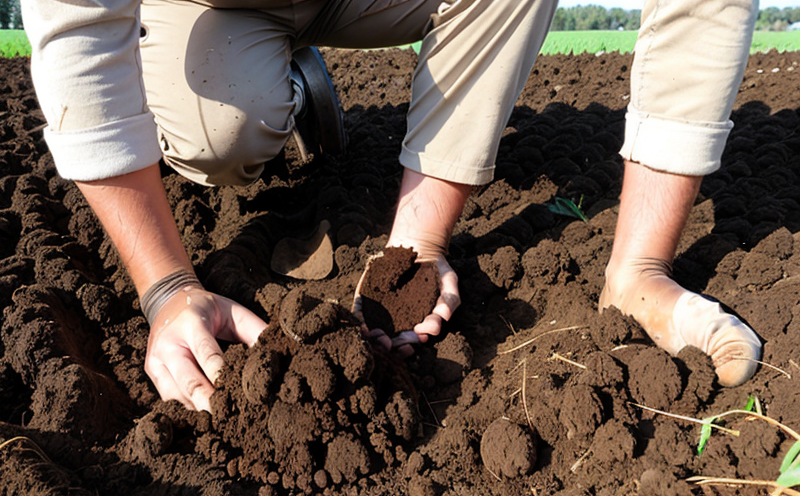Soil Microbial Biomass Carbon Testing
The soil microbial biomass carbon (MBC) testing is a critical tool in assessing the health and productivity of agricultural soils. This test helps determine the amount of carbon present in the living components of soil microorganisms, which are essential for nutrient cycling, decomposition processes, and overall soil fertility.
Understanding MBC levels provides insight into soil resilience against environmental stresses such as drought or pollution. High MBC indicates a robust microbial community capable of decomposing organic matter efficiently, thereby enhancing plant growth and health. Conversely, low MBC suggests potential issues with soil biology that could lead to reduced crop yield.
For quality managers and compliance officers, knowing the MBC levels ensures adherence to sustainable agricultural practices as stipulated by international standards like ISO 17245-3:2019. R&D engineers can leverage this data to develop new fertilizers or soil amendments tailored specifically for enhancing microbial activity in various soil types.
In procurement processes, accurate MBC testing ensures that purchased soils meet the desired quality benchmarks set by your organization’s sustainability goals. Soil samples are typically collected from representative areas of interest using sterile techniques to avoid contamination which could skew results.
The process involves extracting carbon from soil microbial biomass through incubation with glucose followed by filtration and analysis using either CO2 gas chromatography or infrared spectroscopy methods. These analytical tools allow precise quantification of the extracted carbon, providing reliable data for decision-making purposes.
Scope and Methodology
| Step | Description |
|---|---|
| 1. | Select representative soil samples from various locations within the field or study area ensuring they are free from contamination by external sources. |
| 2. | Transfer selected soil samples into pre-weighed containers and dry them at 105°C for 48 hours to reach constant weight. |
| 3. | Grind the dried soil into a fine powder using a mill grinder, then weigh out approximately 2 grams of this powder for each replicate sample. |
| 4. | Mix the ground soil with an equal volume of 5% glucose solution (w/v) and incubate at 25°C under dark conditions for six days. |
| 5. | Filter the mixture through a 0.45 μm filter to separate the microbial biomass from the liquid phase, then dry the filtered residues by vacuum drying at room temperature until constant weight. |
| 6. | Analyze the dried residues using CO2 gas chromatography or infrared spectroscopy to measure the total carbon content attributable to microbial biomass. |
Eurolab Advantages
At Eurolab, our expertise in soil testing sets us apart from other laboratories. Our state-of-the-art facilities equipped with advanced analytical equipment ensure accurate and consistent results every time.
- Comprehensive quality assurance protocols guarantee reliability of each measurement.
- Dedicated team of microbiologists ensures precise interpretation of MBC data.
- Long-standing experience in agricultural testing allows us to offer tailored solutions based on your specific needs.
- Prompt turnaround times, typically within 7-10 days from receipt of the sample.
We also provide comprehensive reports that include detailed descriptions of methodologies used, raw data, statistical analysis, and recommendations for improving soil health where necessary. Our commitment to excellence makes us a trusted partner in all aspects of agricultural testing.
Use Cases and Application Examples
- Precision Agriculture: Monitoring MBC levels helps farmers optimize their irrigation schedules, fertilizer applications, and other management practices to enhance crop yields while minimizing environmental impact.
- Sustainable Land Management: Regular monitoring of MBC provides insights into the effectiveness of conservation tillage methods or cover crops in maintaining or improving soil quality over time.
- Agronomy Research: Researchers studying the effects of different treatments on soil microbiota can rely on MBC data to draw meaningful conclusions about treatment efficacy and ecological implications.
- Silviculture: Assessing MBC in forest soils aids foresters in understanding how various management practices affect tree growth rates and root health under changing environmental conditions.
- Incorporating biochar into degraded lands to promote reclamation efforts. Biochar addition increases soil pH, reduces heavy metal toxicity, and stimulates microbial activity leading to better plant establishment success rates.
- Investigating the impact of climate change on arable land by tracking changes in MBC over extended periods. This longitudinal study provides valuable information about long-term trends affecting global agricultural productivity.





